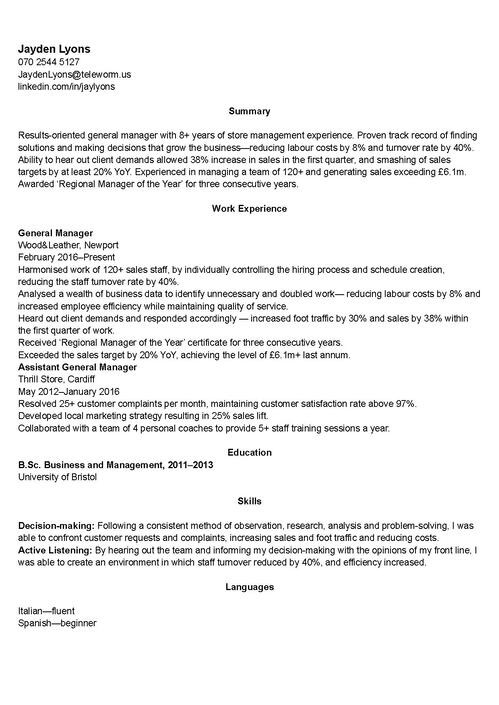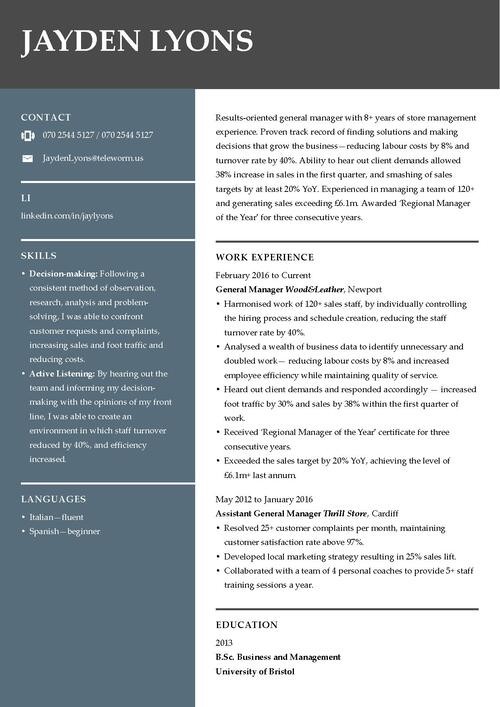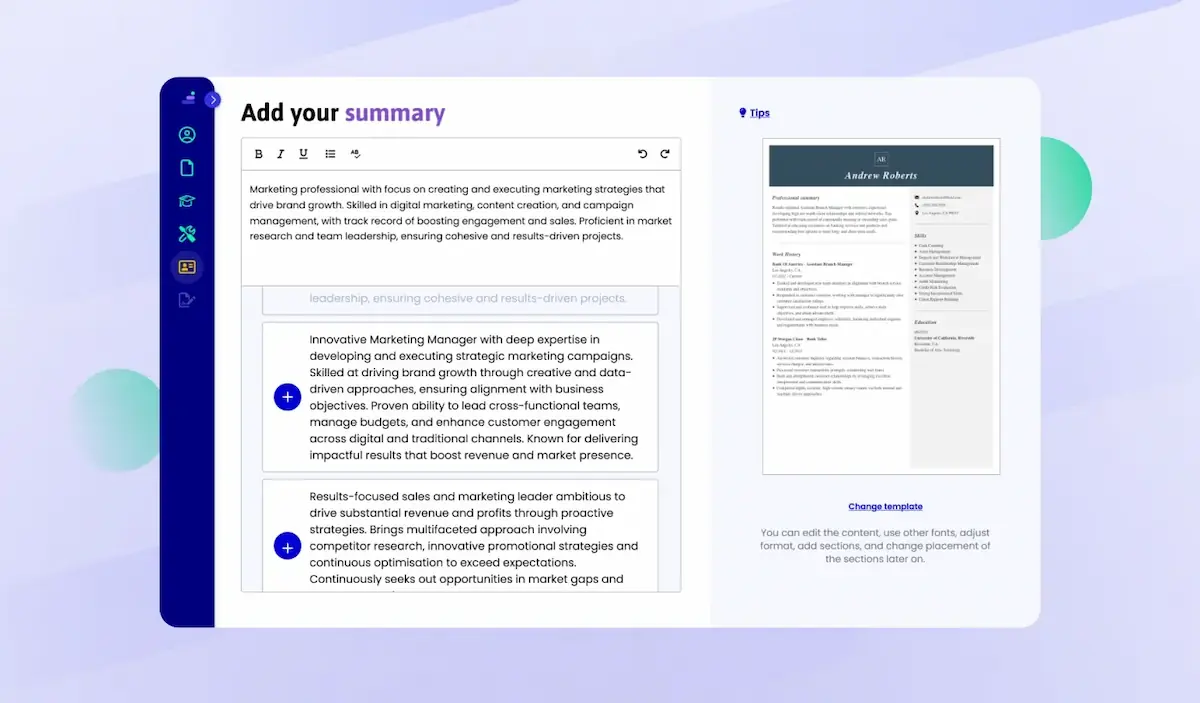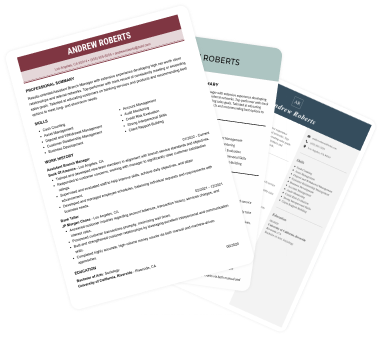Create a professional CV now!
 NO
NO YES
YESLast updated on 29 December, 2025

Our customers have been hired by*:
Decision-making skills are what allows you to select the best choice from a set of two or more options. They’re closely related to problem-solving skills, because they involve using reasoning to choose potential solutions and they’re imperative to running any organisation. So having good decision-making skills can help you in every career.
So, how should you go about showing your decision-making before you work with anybody, and develop decision-making skills examples for your CV? This guide is a good start. By the time you’re done, you’ll have learned what are decision-making skills, how to develop them, and how to include them on your CV.
Create an effective CV in minutes. Choose a professional CV template and fill in every section of your CV in a flash using ready-made content and expert tips.
Create a professional CV now!
 NO
NO YES
YESWe created the sample on the left using our builder. See other good CV examples like this one.
Including other skills for a CV? Check these guides:
Jayden Lyons
070 2544 5127
JaydenLyons@teleworm.us
linkedin.com/in/jaylyons
Summary
Results-oriented general manager with 8+ years of store management experience. Proven track record of finding solutions and making decisions that grow the business—reducing labour costs by 8% and turnover rate by 40%. Ability to hear out client demands allowed 38% increase in sales in the first quarter, and smashing of sales targets by at least 20% YoY. Experienced in managing a team of 120+ and generating sales exceeding £6.1m. Awarded ‘Regional Manager of the Year’ for three consecutive years.
Work Experience
General Manager
Wood&Leather, Newport
February 2016–Present
Assistant General Manager
Thrill Store, Cardiff
May 2012–January 2016
Education
B.Sc. Business and Management, 2011–2013
University of Bristol
Skills
Languages
These transferable skills translate to a range of tasks and occupations, so it’s more than likely that you have fostered them already, and it’s even more likely that you will require them in the future.
Even though research shows that 50% of people rely on their gut instinct to make decisions, that’s a hard thing to put across on your CV. It is far more productive to focus on the aspects that can be trained and applied. They’ll provide much better proof of your professional abilities.
So let’s get started with a list of examples of decision-making skills that you ought to weave into your CV.
A decision maker who relies solely on intuition, hunches, and conviction without considering others' input lacks essential interpersonal skills and behaves more like a narcissist than a leader. Similarly, a decision maker who fails to explain their decisions is a tyrant, not a leader.
Even when decisions have to be made by you individually, you cannot make an informed decision without hearing out all the viewpoints. Regardless of how you make decisions, and what decisions you make, and whether you make them yourself or in compromise—you better learn to listen. That's what active listening is all about. Eliciting key information, or information that would be withheld otherwise is an acute skill that sets apart the most efficient leaders.
There will be times when you need to consider shared decision making. Teamwork skills means the ability to collaborate, compromise and reach the best solution as a group, or even sit aside and mediate the different viewpoints. These are all invaluable components of an executive decision maker.
Communication skills are invaluable to any full-package decision maker.
Aren’t these interpersonal skills, too? Yes…and no. You’re going to have to communicate constantly. Many times, you won’t be approaching a specific person or goal in mind, but need to consider the way you communicate decisions in order to achieve full buy-in.
First thing to remember is that they are as much about speaking as about listening. The best leaders are skilled at reading the room, and eliciting information and opinions through precise, relevant questioning.
The best leaders and decision makers have a trait in common, they are able to lead people to reach the same conclusions, instead of just presenting them as an obvious fact.
By supplying the key information and asking the right questions, you can get everyone on the same page—and they will do it by themselves. This is how you get the team behind any decision that is made.
Conflict management skills come in when you need to get people behind your decision, by resolving conflicts and objections early. They require strong problem-solving abilities to identify the root causes of conflicts, develop solutions, and implement strategies that resolve issues while maintaining positive relationships. Different from persuasion tailored for taking people off the fence, it is more about anticipating things that might take people very far away from the fence.
Decision-making is not only about making the right call at crunch-time. It’s about making those calls again and again. It’s about being trusted every time you make a decision. Integrity is a big part of that trust—leaders unwilling to admit mistakes will not be trusted the next time.
Decision-making is not just about pulling the trigger, it’s just as much about organizing what’s going to happen as a consequence, to make sure the outcome is exactly as expected. Work must be planned in a way that’s explained, effective, and has a clear path to the goal.
Martin Luther King Jr. improvised the ‘I Have a Dream’ speech. Sometimes going off-script, the hunch, the intuition, the inspiration lead to the best decision. Best decision makers are forged in the 11th hour—when they have very little time left to think.
A strong CV summary will convince the recruiter you’re the perfect candidate. Save time and choose a ready-made personal statement written by career experts and adjust it to your needs in the LiveCareer CV builder.

Once you’re acquainted with the range of components that make up your decision-making skills, it’s time to decide how to write that CV! For most applications, we urge you to follow the classic work experience first model.
The top of every worthy CV is adorned with a CV personal statement, also known as the CV summary. As the attention grabber of your application, it may be the only thing someone skims before deciding to read on. Therefore, you cannot slouch in plugging your decision-making skills here:
Results-oriented general manager with 8+ years of store management experience. Proven track record of finding solutions and making decisions that grow the business—reducing labour costs by 8% and turnover rate by 40%. Ability to hear out client demands allowed 38% increase in sales in the first quarter, and smashing of sales targets by at least 20% YoY. Experienced in managing a team of 120+ and generating sales exceeding £6.1m. Awarded ‘Regional Manager of the Year’ for three consecutive years.
The work experience section should also be studded with your decision-making skills. This is the most room you will have to elaborate on them. Here are some CV tips on how to get it right.
Work Experience
General Manager
Wood&Leather, Newport
February 2016–Present
Well, it’s actually an easy decision, there are some set rules here. If you have 3+ years of experience already, there isn’t really much to be achieved by listing your extracurricular activities from your degree that you started almost a decade ago. Just write down your degree or highest level of education.
If you’re fresh out of school and writing a student CV, it’s a good idea to flesh out your CV education section with relevant modules and extracurricular activities.
Education
B.Sc. Business and Management, 2011–2013
University of Bristol
Relevant Modules: Introduction to Risk, Business Decision-Making, Logic, The Scientific Method
Extracurricular activities
Captain of University Debating Society, leading to a Top 3 National finish in 2015
Treasurer of the Philosophy Society: Undertook review and readjustment of budget decisions to host regular monthly speaker events at a lower scale instead of one big one every six months—increasing total attendance by 145% at the same budget.
The CV skills section should be focused correctly for maximum impact:
Skills
You have some more decisions to make—regarding additional sections. The perfect CV is not rounded off with an ‘Additional Info’ section filled with a jumble of random facts and activities. Here’s how to stand out:
Certifications
Languages
First, kudos for striving to be better. Now it’s time for an honest appraisal of what needs the most improvement, and how much of it. Perhaps you need to learn some simple tricks; or perhaps you need an attitude change; or perhaps a decision-making course would be best.
There are plenty of ways to develop your decision-making skills. Here are a few suggestions.
First, identify the area that requires your decision-making to improve or resolve a situation. Be specific, make sure you understand the problem, and what is asked of you. Failure to prepare here ensures missing the mark completely.
You need to understand the what, who, where, when and why. Dig through relevant information, speak and most importantly—listen to the right people, and think about what else could be useful in informing your decision.
Try to draw as many paths to success, whether you instinctively know they’ll work, or if it’s a wild idea. Write down and consider all options. Go away. Come back, and do it again.
Now take all the possible solutions, and evaluate the pros and cons of each, write down how you instinctively feel about them, and your factual reasoning based on the data you have available. Go away. Come back, and do it again.
At this stage, it may be useful to consult your reasoning with someone. It could be a superior, a relevant colleague, or just someone you trust. You don’t have to throw out all your wild ideas—sometimes you just need to check your reasoning for picking one is sound and valid.
Here’s where your decision-making skills culminate. Pick the strongest solution (or combination of solutions). Do so confidently and ensure you can justify your decision too.
Once the direction is set, it’s time to put the wheels in motion. Make your decision clear, transparent and justified to those who ought to be notified. Then take action to realise the thing you set out to achieve.
After some time, look back on the outcome of your decision and evaluate it for yourself. Think about what you could have done differently, what pushed you towards the wrong or right choice, and what your biases were. This is a teachable moment.
With a course that will help you understand risk and the decision-making process better.
This particular decision-making course at Coventry University is a module pulled directly from their MBA program—so you are learning the same skills as future leaders of business and the world at large.
Don’t forget to write a cover letter. That’s one of the best decisions you can make when applying for a job.
You don’t have to be a CV writing expert. In the LiveCareer CV builder you’ll find ready-made content for every industry and position, which you can then add with a single click.

Our editorial team has reviewed this article for compliance with LiveCareer’s editorial guidelines. It’s to ensure that our expert advice and recommendations are consistent across all our career guides and align with current CV and cover letter writing standards and trends. We’re trusted by over 10 million job seekers, supporting them on their way to finding their dream job. Each article is preceded by research and scrutiny to ensure our content responds to current market trends and demand.
Category: CV Help
Crafting a job-winning CV is all about showcasing your unique skills and experiences. Start with a strong personal statement that highlights your career goals and achievements.
Try Our CV Builder Now